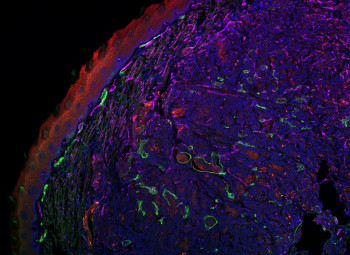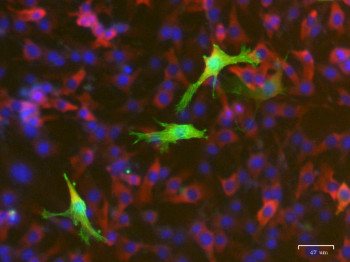Background
I came to DePauw in 2023 after working as an Associate Professor at Marian University. I started my academic career at Purdue University, where I studied chemistry and had the opportunity to participate in undergraduate research, where I studied the biochemistry of cancer cells. Research fascinated me and changed my career plans to pursue a PhD in Cancer Biology from the University of Chicago. After earning my PhD, I took a postdoctoral role at the National Institutes of Health, where I developed a love of collaboration and mentoring. Cancer Biology is a multidisciplinary field, and my interests include molecular biology, signaling, and immunology. Teaching courses like Molecules, Genes, and Cells (BIO 101), Intermediate Cell Biology (BIO 241), and other upper-level courses allow me to share my interests in those diverse fields. I love being in the lab and mentoring independent research for undergraduate students. I also have
Lines of Research
- Mechanisms of endothelial and cancer cell interactions in metastasis (Ongoing)
- Molecular cues in muscle cell hypertrophy (Ongoing)
Mechanisms of endothelial and cancer cell interactions in metastasis (Ongoing)

Metastasis is the spread of cancer cells from the primary tumor to distant locations. Once the cancer has spread, it is usually incurable. While it is not always possible to prevent metastasis, early detection can significantly improve outcomes and response to treatment. In my lab, we are interested in understanding some of these early steps in the metastatic process to predict and prevent the spread of cancer cells. In particular, we are interested in how endothelial cells communicate with cancer cells to provide a means for metastatic spread. Using a cell culture-based model, we investigate questions about how different conditions, interactions, and gene signatures can change the propensity of metastasis for different types of cancer cells. Together, this may help us to understand how to diagnose and treat aggressive cancers more effectively.
Student Collaboration
There are many ways that students can participate and contribute to this work. The cell-based model has allowed students to identify pathways and processes of interest and design their own experiments around these concepts. Students have identified interesting genes, used experimental methods to turn these genes on or off to explore their effect on cancer properties, investigated signaling pathways, and tested responses to different chemotherapeutic drugs.
Publications and Student Presentations and Awards
This publication describes many of the techniques we use to investigate the questions in our lab. The paper describes the initial experiments performed to develop the cell culture model we use in the lab and some of the methods and resources we apply to answer novel questions. I have also included several student works and presentations.
Doçi CL, Mikelis CM, Molinolo AA, Amornphimoltham P, and Gutkind JS. Genetic Identification of SEMA3F as an Antilymphangiogenic Metastasis Suppressor Gene in Head and Neck Squamous Carcinoma. Cover, Cancer Res. 2015 Jul 15;75(14):2937-48. PMID: 25952650
McIntyre, Grace, Liette, Breea, Harmon, Grace and Nathan Hubbard. Elucidating the Pathological Role of HOXA5 as an Essential Metastatic Regulator. 2020 Sigma Zeta Research Award; presented at the 2021 Sigma Zeta National Convention; 2021 Sharon Gall Lecher Memorial Research Award; Presented at the 2022 Marian University Undergraduate Research Symposium.
Main, Kegan, and Nouredean N. Khrisat. Role of CBX5 in head and neck cancer cell phenotypic expression. Best Poster Presentation, 2020 Marian University College of Osteopathic Medicine Research Day.
Molecular cues in muscle cell hypertrophy (Ongoing)

Exercise is an integral part of a healthy lifestyle. While each type of exercise provides benefits, resistance weight training is one of the most effective anti-aging interventions. However, the molecular basis for this benefit is unclear. Resistance training triggers the release of unique chemicals and stimuli that may be responsible. We are currently investigating the ability of these resistance training-associated signals to drive muscle cell growth and expansion, known as hypertrophy. Ultimately, we believe this research may help us to understand how these different interventions work on a cellular level and create opportunities to prescribe exercise in medicine.
Student Collaboration
This project was conceived and initiated by undergraduate students in Exercise Science as part of their senior thesis. The success of their study led to a larger expansion of this work, and there are currently several opportunities for students to contribute. This could include identifying and testing novel compounds associated with weight training, adding new assays to test different hypertrophy phases, and looking at biophysical impacts on muscle cell function.
Student Presentations and Awards
These presentations highlight the student-driven nature of my lab's work and the emphasis on independent growth and opportunity for young scientists.
Reine, Ashley. Myokine signaling in skeletal muscle attachment. Presented at 2023 Marian University College of Osteopathic Medicine Research Day.
Heady, Lucas, and Zachery Gruver. Investigating IL-15 and Branched-Chain Amino Acids in Resistance Training-Associated Hypertrophy. 2021 Sigma Zeta Research Award; presented at the 2022 Sigma Zeta National Convention and 2022 and 2023 Marian University Showcase of Scholarship.
How does research influence my teaching at DePauw?
One of my favorite quotes is from Zora Neale Hurston's autobiography. In it, she said, “Research is formalized curiosity. It is poking and prying with a purpose”. The opportunity to engage in undergraduate research changed my career trajectory and inspired my love of science in ways I had not expected. I try to bring those same authentic experiences from my research to the classroom and allow students to express and explore their curiosity. I also try to help students develop the tools to think critically, test their ideas diligently, and communicate their work passionately. Teaching and research together allow me to poke and pry with genuine purpose.